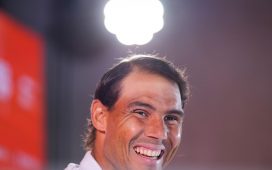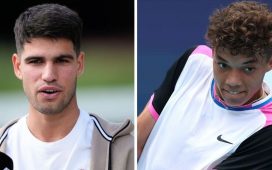MADRID — Before there was Novak Djokovic, there was Janko Tipsarevic.
Three years older than Djokovic, Tipsarevic was the tennis prodigy with the strong personality and powerful groundstrokes who first emerged from the ashes and acrimony in Serbia as a great prospect for the men’s game.
He grew up practicing in Belgrade with Ana Ivanovic, a future star in the women’s game, and others on a cramped tennis court that had been laid out on the floor of a drained swimming pool.
With Yugoslavia in the midst of a violent breakup, there were no funds to build a more conventional indoor facility.
If players ran too far outside the alleys, they would quickly smack into a wall. But Tipsarevic and his fellow Serbs smashed through plenty of barriers on their way to one of the most surprising collective success stories in tennis history.
Tipsarevic was the world’s No. 1 junior in 2001, with a taste for tattooing his body, dyeing his hair and speaking his mind.
Though Djokovic would leave the more indelible mark at home and abroad, becoming one of the greatest players of all time, Tipsarevic had major moments of his own: breaking into the top 10 and playing a big role in Serbia’s run to its first and only Davis Cup title, in 2010.
Viktor Troicki won the decisive match of that final against France in Belgrade, defeating Michaël Llodra.
“The most memorable moment of my career,” Tipsarevic said on Wednesday, pointing toward Troicki, who was sitting nearby. “I know it sounds silly because I was not involved in the actual match. But it’s the highlight of my career as I see it.”
After seven surgeries, several lost seasons and a valiant if unsuccessful run at a triumphant comeback this year, Tipsarevic’s career is set to end in Madrid this week at the Davis Cup finals.
The 35-year-old Tipsarevic, the 33-year-old Troicki and the 32-year-old Djokovic have gathered for one more group swing at the title. Even if this re-formatted, quick-hitting competition bears scant resemblance to the long-form grandeur of the Davis Cup that Serbia won in 2010, this is the way Tipsarevic wanted to finish: exchanging hugs and jibes with teammates who are also soul mates.
They and their captain, the former doubles star Nenad Zimonjic, have been through more than most together.
The court in Belgrade is back to being a pool. They have all made millions or, in the case of Djokovic, hundreds of millions. But memories remain of the trail they blazed and the odds they beat: the long waits for visas, the search for the funds to keep traveling and progressing.
“Our tennis came out of nothing, came out of the mud,” Tipsarevic said in an interview earlier this year. “It was no grand plan. There was a lot of luck and a lot of talent and sweat.”
He made his Davis Cup debut at age 15, playing for Yugoslavia in a fourth-division, Euro-African zone tie against Monaco in Tunis in May 2000. The stands were mostly empty, which may turn out to be good preparation for his full-circle moment considering how many empty seats there have been so far in Madrid.
But Tipsarevic and Troicki did not seem to mind the echoes inside Center Court on Wednesday as they won the closing doubles match against Japan, after Djokovic had given Serbia an insurmountable 2-0 lead with a 6-1, 6-2 win over Yoshihito Nishioka.
Serbia can ensure a spot in the quarterfinals with a victory over France on Thursday.
Only a few thousand fans stayed in the stadium to watch the doubles, but Tipsarevic still went full tilt and lifted Troicki off the ground in a bear hug after their 7-6 (5), 7-6 (4) victory over Ben McLachlan and Yasutaka Uchiyama.
“It’s been 20 years,” Tipsarevic said. “I don’t feel I love Serbia more than anyone else on the team or any normal Serbian person. The main reason I played so many years was I loved playing with the guys here.”
Tipsarevic’s thoughtful, iconoclastic vibe does not translate particularly well to the space constraints of a news article. He speaks in long paragraphs, as does Djokovic. The two, who have known each other since boyhood, exchange thoughts often and not just about tennis.
“I shared with him a lot of wonderful emotions in my life,” Djokovic said earlier this season. “Very outspoken guy, very honest, someone that speaks his mind, cares a lot about integrity of the sport as well. Was very vocal always for the players and what they deserve.”
But through the years, Tipsarevic has been asked many more questions about Djokovic than Djokovic has been asked about Tipsarevic. Though others might have bristled, Tipsarevic has learned to embrace the situation.
“Novak is beyond sports,” he said when asked yet again about Djokovic on Wednesday. “Serbia as a country has had its political difficulties over the period of the last 15, 20 years, so something that people were cherishing and looking forward to was the accolades and good performances of our athletes. Novak, by himself, as a single entity has obviously brought and is still bringing incredible joy to an everyday Serbian person.”
It is unclear how much delight a second Davis Cup title would deliver to Serbia. The victory in 2010 was cathartic on many levels: a sign of the nation’s resilience and also a springboard to Djokovic’s rise to the top of the men’s game the following year and to his long-term tussle for supremacy with Roger Federer and Rafael Nadal.
Tipsarevic, a member of the Big Three’s tennis generation, can only tip his cap to their staying power.
“These guys have more than 50 Grand Slams combined, and they are still constantly working to improve,” he said. “I was in Novak’s box for the first round of the Australian Open this year. He won easily, and I saw a difference in his return. He was holding the head of the racket higher. I know his game inside out, and I asked him after the match in the locker room, ‘Did you change your return?’ And he said yes and that they had been working in the off-season to make him feel much more compact on faster balls coming his way.
“So imagine this: A guy who has not only the best return of today but of all time, nobody is close, was working in the off-season to improve his return. This is how obsessive these guys are.”
Tipsarevic understands what is required but knows his body can no longer stand the strain. That does not mean he is done playing a role in the game he did not fully appreciate in his youth.
He has his tennis academy in Belgrade, with more than 70 employees, and his ability to look at the sport in depth and from unusual angles would make him quite a coaching candidate.
“I understand very clearly that for a young mind, it’s way more challenging to deal with all the world issues and all the green grass and beautiful sky of Instagram in 2019 than when I was growing up,” Tipsarevic said. “I don’t want to sound pretentious, but I have a strong feeling after my tennis career that I will coach a big-time player at one point.”







